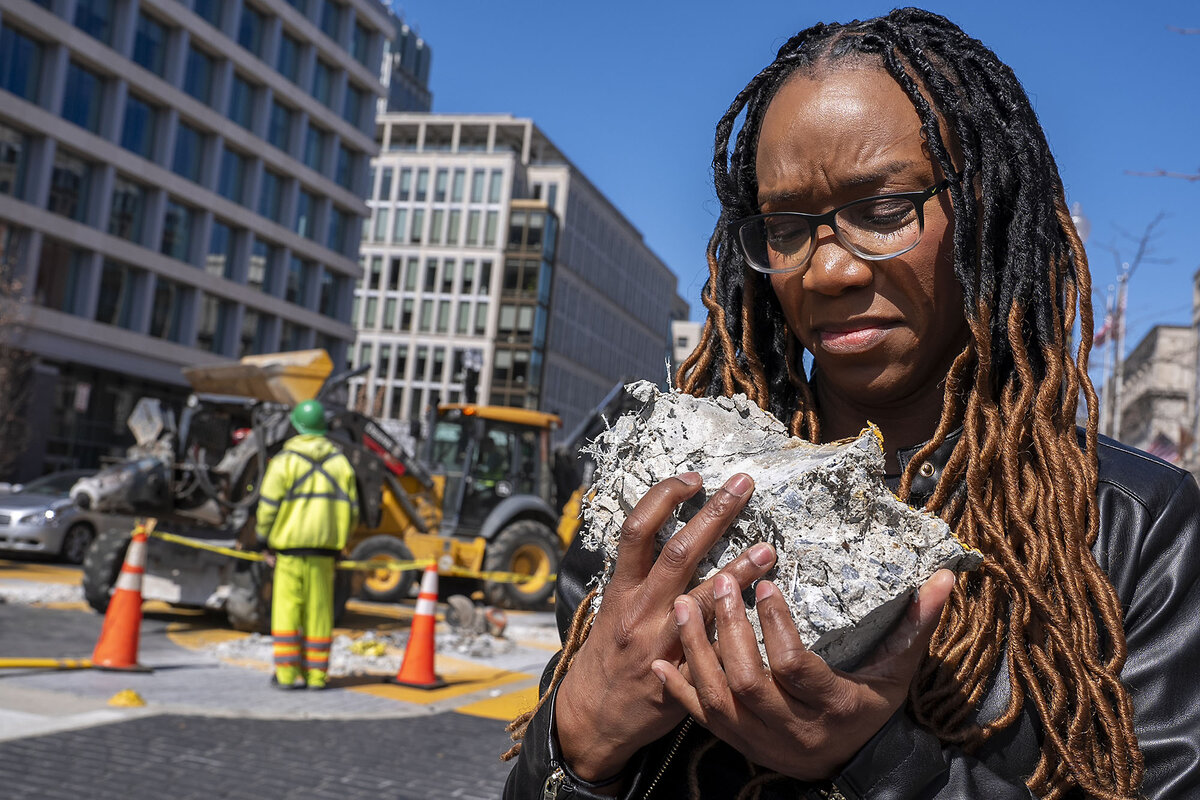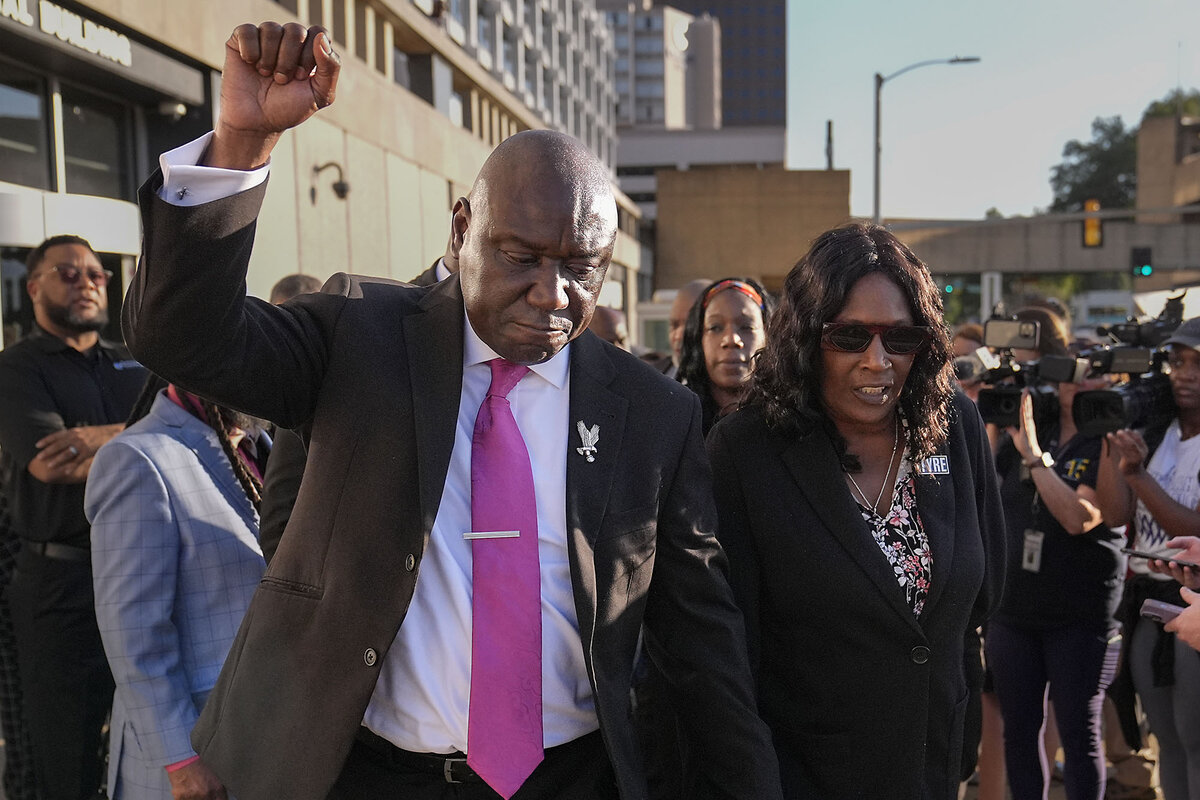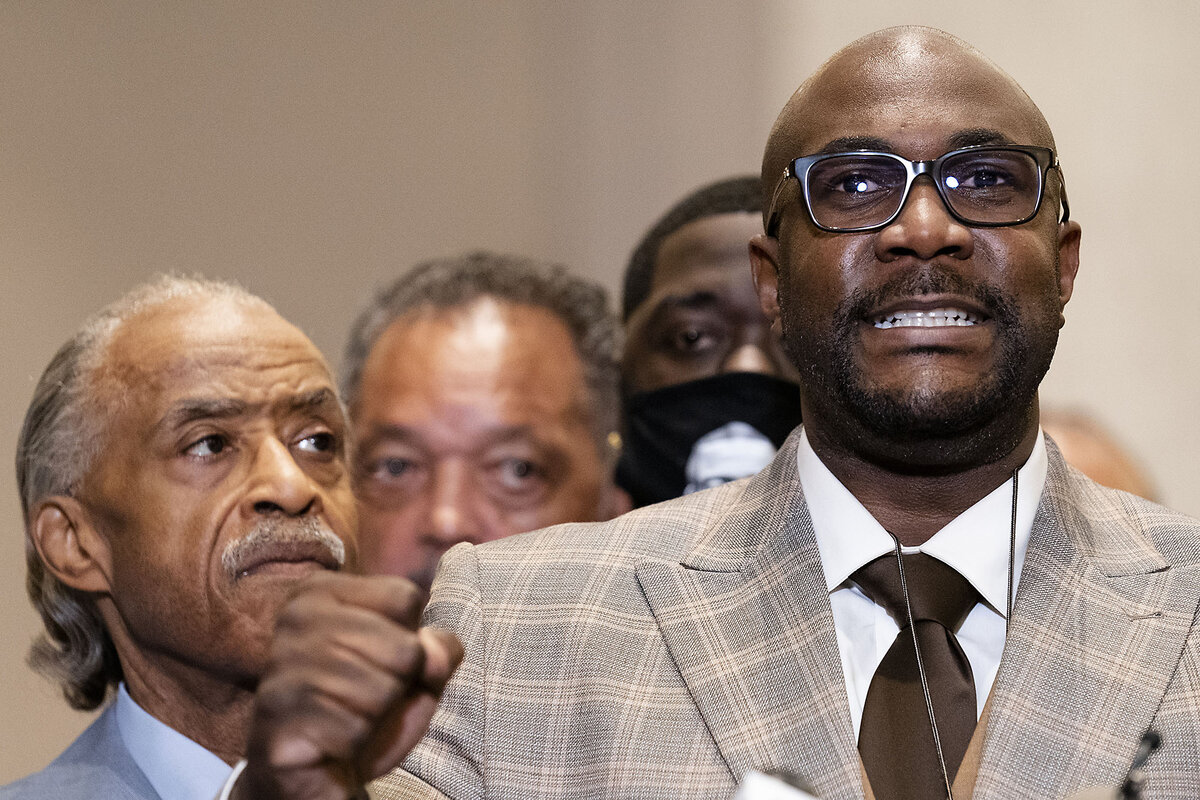George Floyd’s family lawyer thinks the path to justice is ‘more daunting than ever’
Loading...
It’s been five years since George Floyd’s murder by a police officer in Minneapolis set off a wave of international protest and the Black Lives Matter movement. And the lawyer who represented Mr. Floyd’s family in the case thinks it’s harder now than then to get his clients justice.
Ben Crump has dedicated much of his career to representing the families of Black people who were killed in wrongful death lawsuits. If BLM protesters demanded people “say their name,” there’s a good chance Mr. Crump was involved in the case.
Those include Trayvon Martin, Michael Brown, Breonna Taylor, Ahmaud Arbery, and Jacob Blake.
Why We Wrote This
Five years ago, the murder of George Floyd by police sparked a protest movement across the United States. We spoke with Ben Crump, the civil rights lawyer who represented his family, about trying to hold police accountable today.
The issue of excessive police violence against Black people has faded some from the headlines. But things haven’t slowed down for Mr. Crump.
He had just been back in his home state of Florida announcing a lawsuit with the family of Roger Fortson. Mr. Fortson was a U.S. airman shot and killed inside his own apartment by a police officer who was responding to what turned out to be a false domestic disturbance call. Mr. Crump had to reschedule our interview because he needed to be in the courtroom in Michigan during the murder trial of the police officer who killed Patrick Lyoya in April 2022 after a scuffle. When we spoke, a jury was in the middle of deliberations in another one of his cases – the murder trial of three officers for the beating death of Tyre Nichols in Memphis, Tennessee.
Since then, the three former officers were acquitted of all state charges by a jury from an out-of-town, majority-white county hundreds of miles from Memphis. (Two others pleaded guilty before the trial.) In Michigan, a mistrial was declared in the murder trial of the officer who killed Mr. Lyoya, after the jury couldn’t reach a unanimous verdict.
The Monitor spoke with Mr. Crump by phone about how things have changed since Mr. Floyd’s death – and what remains the same. This interview has been edited for length and clarity.
We’re coming up on the five year anniversary of George Floyd’s death. I wanted to get your perspective on what has changed – and what hasn’t – in that period, and whether things did change then slip back.
I think you hit the hammer on the nail. It is. It’s a journey to justice. There are times where you make progress, you take two steps forward, and then regrettably there are times when you take a step back. I think right now we are taking a step back from the progress we made in the aftermath of the killing of George Floyd.
Now, with the current state of affairs in America, it’s getting more daunting than ever to hold police accountable for excessive force and police brutality and wrongful death.
There’s been a lot of discussion that backlash against the Black Lives Matter movement helped lead to Donald Trump’s election in part this time around. I wanted to get your perspective on whether you think that’s true, and if so why you think that happened.
A lot of this stems from the reaction to the election of the first Black president in the United States history. It’s not in a vacuum. When you see certain periods in American history where we make progress as it relates to racial and social justice, unfortunately there’s always backlash to that. And I think we’re witnessing that.
And it’s no different from any other period of time in American history. After the Civil War, there was backlash. After the Civil Rights [Movement] and they passed the civil rights bills, there was backlash. And now I believe not just Black Lives Matter, but really it is a reaction to the election of the first black president. I think that explains, on a greater level, this reaction we’re seeing in America. The attack on DEI, the attack on Black history, Black literature and Black culture, I think it is a reaction to that more than Black Lives Matter, in my opinion.
We have to acknowledge the racist and oppressive history in America if we’re going to be able to learn from it and not repeat sins of our past. Those who do not intend to accurately teach history, I believe, intend on trying to repeat history. And so we have to be very, very cognitive about the cycles that happen in America. We have to always try to say we’re better than the things that divide us that ignorance preys on. We have to be better than our fathers and our grandfathers were. So that has to be the constant goal.
Racism in America has been so normalized that when you fight for equality, they call that anti-American. And that is a sad dynamic that we civil rights lawyers often face.
Since George Floyd’s murder, have you noticed any shift in how juries and jury pools view police? Are people just more polarized in their views of police, and whether or not to trust them? Do you think it’s easier or harder now to get justice in cases of police brutality?
I think it’s more challenging, just because of the sentiment and the rhetoric coming from our most prominent national leaders at this time.
Have you noticed that in jury selection?
Not amongst juries, but amongst the officers of the court, the politicians, and the prosecutors.
How much have police body cams and the explosion in smartphone usage had on how people view cases of alleged police brutality?
It’s been a sea change. Once you have visual evidence and ocular proof, you just can’t say that Black people and the marginalized people who are advocating for justice are just exaggerating.
You have the visual proof that Sonya Massey was shot in her face by the police officer in her home when she called 911 because she was having a mental health crisis and thought a prowler was outside her home.
You have visual proof of Patrick Lyoya being shot in the back of his head when he did nothing aggressive towards the police officer, just trying to walk away from him.
And you have visual evidence of Tyre Nichols literally being beaten to death by five police officers, where he said, I just want to go home.
And so you have these videos now that make it harder for them to try to look away, to try to justify this police brutality and this excessive force. So thank God for the technology.
But what we’re seeing now is, no matter how vivid and riveting the video is, there seems to be an attempt not to hold the killer cops accountable.
You’ve been called Black America’s attorney general. I’m curious how you feel about that nickname.
I take it humbly, understanding with the people you know bestowing that title to you, there’s a certain level of responsibility to try to be an advocate, a legal advocate, for Black people throughout America.
I’ve tried as much as possible to always be humble, and understand that this is a calling that God has on my life, and I’m trying to be obedient and faithful to God’s calling on my life. I don’t try to be arrogant or anything about it. No, it’s a humbling responsibility that you accept and you try to live up to, to the best of your ability.
What do you think of the actual attorney general? I’m specifically curious about your thoughts about how the DOJ’s Civil Rights division is being refocused away from investigating police departments and traditional civil rights cases and toward combating antisemitism, transgender athletes in women’s sports, and anti-Christian bias. Hundreds of career lawyers have left.
Well, I’m sad that there has been this refocus by the Department of Justice Civil Rights Division. Historically, the federal government was the institution that we could turn to when you had state actors who have symbiotic relationships with the state police, and so they were disincentivized to hold them accountable because of their relationships. But now it’s sad that we can’t count on the federal government Department of Justice to make sure the constitutional rights of marginalized citizens are protected in these civil rights cases.
It’s as if we have to save ourselves with no assistance from the federal government.
You know, Black people in America are used to having our hearts broken by America and the government. But this is really stark – a stark contrast to even things we’ve seen.
You’ve worked police brutality cases going back to the George W. Bush administration. I’ve seen plenty of criticisms from civil rights leaders at how the DOJ Civil Rights Division has been used from the Reagan years through every subsequent Republican president. Is this in line with that, or do you think this is a different animal?
This is a different animal. We’ve never seen the Civil Rights Division at the DOJ being used as it is being used today.
We have to continue to try to make the case that the Constitution should apply to all Americans, and that the objective is still equal justice under the law. This notion of equal justice under the law must be championed more than ever. In times where it seems as if constitutional rights are under attack on many levels, we must continue to say, “But it’s about equal justice under the law.” The law is supposed to be an instrument for good, never to be used as a weapon for oppression.
There have been some prominent conservatives, like podcaster Ben Shapiro, who have encouraged President Trump to pardon Derek Chauvin, the police officer who was convicted of murdering George Floyd. That wouldn’t change that much given the state convictions against him, but what do you make of that push?
It’s very sad. It just shows us what an unfortunate moment this is in American history. When we talk about pardoning an individual who swore to protect and serve who put a man to death by having his knee on his neck [for] 9 minutes and 29 seconds, it is a very sad commentary of where we’re at in America that they believe that that is appropriate.
I remember in interviews after his brother’s death, Philonise Floyd talked about wanting to make sure it hadn’t been for nothing, that if it changed things it would be a salve. Have you talked to George Floyd’s family members recently? How do they feel?
I have. We stay in contact, some of us. Like most people in America, especially Black people, they feel like we’re facing unprecedented attacks that we’ve never had in our lifetime. So they understand that the legacy of their brother’s tragic death looms large.
Do you think if George Floyd’s murder happened today, there would be a similar reaction to what we saw five years ago, or do you think the backlash has overtaken that?
It’s hard to say. Once you see somebody literally get tortured to death by police for that long a period of time, it has to leave a permanent impression on your conscious mind. Once you see that video, I don’t think you can unsee the video.
And so my optimism wants to believe, yes, that there would be an outcry. You can’t say for certain, but I want to believe that humanity requires you to be outraged.
You were heavily involved in the bipartisan efforts to pass federal police reform after George Floyd’s death. It passed the House but failed in the Senate. Some states have passed laws banning chokeholds and other law-enforcement policies. Have you seen those laws have an impact?
The states that have greater accountability for police – on the biggest level, citizens have more trust in their policing, citizens of color. I think a big part of this is about police-community relations. And when I say police-community relations, I’m meaning the entire community, not just the community that says, “Let’s lock up poor people and minorities and throw away the key” – police-community relations, where you say you want to have a police department that is responsive to the community and cares about everybody in the community, not just an affluent few.
Martin Luther King Jr. famously said that the arc of the universe is long, but it bends toward justice. You talked about two steps forward, one step back. What do you hope comes out of this moment?
Well, I’m an eternal optimist. I always believe the glass is half full versus half empty. And I believe in the future.
I believe these young people get it. I think that’s another reason why we’re seeing a lot of backlash, because you saw just as many young white people out protesting in the aftermath of the killing of George Floyd as you saw Black people. And I think it gives us hope for the future that they didn’t see a Black human being being tortured to death – they saw a fellow human being being tortured to death – by the police with his knee on his neck for 9 minutes and 29 seconds.
And so I think if there’s one thing I take away from George Floyd is that we have hope. We at least have hope.









